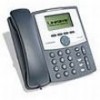Linksys SPA922 Cisco SPA9000 Voice System Administration Guide - Page 262
XFER Bridge Mode, SPA9000, while the SPA9000 acts as a proxy for the RTP
 |
UPC - 745883570836
View all Linksys SPA922 manuals
Add to My Manuals
Save this manual to your list of manuals |
Page 262 highlights
SPA9000 Field Reference Voice tab B XFER Bridge Mode Instructs the SPA9000 how to handle call transferring of an external caller to another external number by a client station. The normal way of performing this operation is for the SPA9000 to send a SIP REFER method to the calling device to let it contact the transfer target directly. The SPA9000 then drops out of the call completely. This requires the calling device (the transferee) and the target device to understand the SIP signaling involved and the operation permitted by the underlying service providers. Note that the call legs with transferee and the transfer target might be with different ITSP. The SPA400, for instance, cannot handle this operation. With bridging, the SPA9000 maintains two separate call legs throughout the call: one with the transferred call and one with the transfer target. The two call peers connect only with the SPA9000, while the SPA9000 acts as a proxy for the RTP packets exchanged between the two parties. This parameter has three possible values: none -Do not bridge call transfer (use the normal REFER method) all -Bridge all call transfer all except same line-Bridge call transfer only if it is between 2 different Line interfaces SPA9000 Voice System Administration Guide 260















